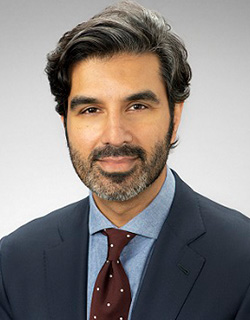How the Dance Center is changing the way doctors communicate with patients
April 26, 2021
Head and neck cancers have a variety of causes, including human papillomavirus (HPV) infection, alcohol and tobacco use, sun exposure, poor oral health, or occupational exposure to hazardous materials. Regardless of the cancer's cause, recovery often depends on how quickly a patient can begin treatment. The experience of starting treatment is of particular interest to Farzad Masroor, M.D., a surgeon at GBMC's Milton J. Dance, Jr. Head and Neck Center, and his team.
"The head and neck areas are how we interface with the world," he said. "The mouth and throat are vital to talking and tasting, and when treatments focus on those areas, it will invariably affect a patient's quality of life."
To help minimize the need for invasive treatments like surgery and radiation, Dr. Masroor and his colleagues prioritize early detection and care to yield the best possible outcomes.
Although patients are encouraged to see their primary physicians or dermatologists before making an appointment with a surgeon, Dr. Masroor also recommends that patients refer themselves if they are concerned that cancer is present.
"I would rather see my office filled with people who I can reassure about their health than have patients delay care and end up with something seriously wrong that requires a significant procedure," he said.
Courtesy phone consultations with a head and neck surgeon at the Milton J. Dance, Jr. Center are available for patients in these instances. Though these are not designed to replace in-person visits, they allow patients to seek reassurance or validation about medical concerns from a professional.
"We live in a time when you can communicate with someone on the other side of the world, yet for some reason in healthcare, we place all these barriers between effective doctor/patient communication," he said. "A consultation can involve reassuring a patient who's seen multiple providers and just needs another set of ears to [listen and give] a second opinion."
Phone consultations are a newer service being offered by the Milton J. Dance, Jr. Center due to need and the effects of the COVID-19 pandemic, but the team plans to continue them in the future.
"I don't think what we're doing here is common practice," he said. "But we know open communication between doctors and patients is better for everyone, and it ties into our broader mission to get patients to a timely diagnosis."
To learn more about Dr. Masroor and his team's work, visit www.gbmc.orghttps://www.gbmc.org/headandnecksurgery.



